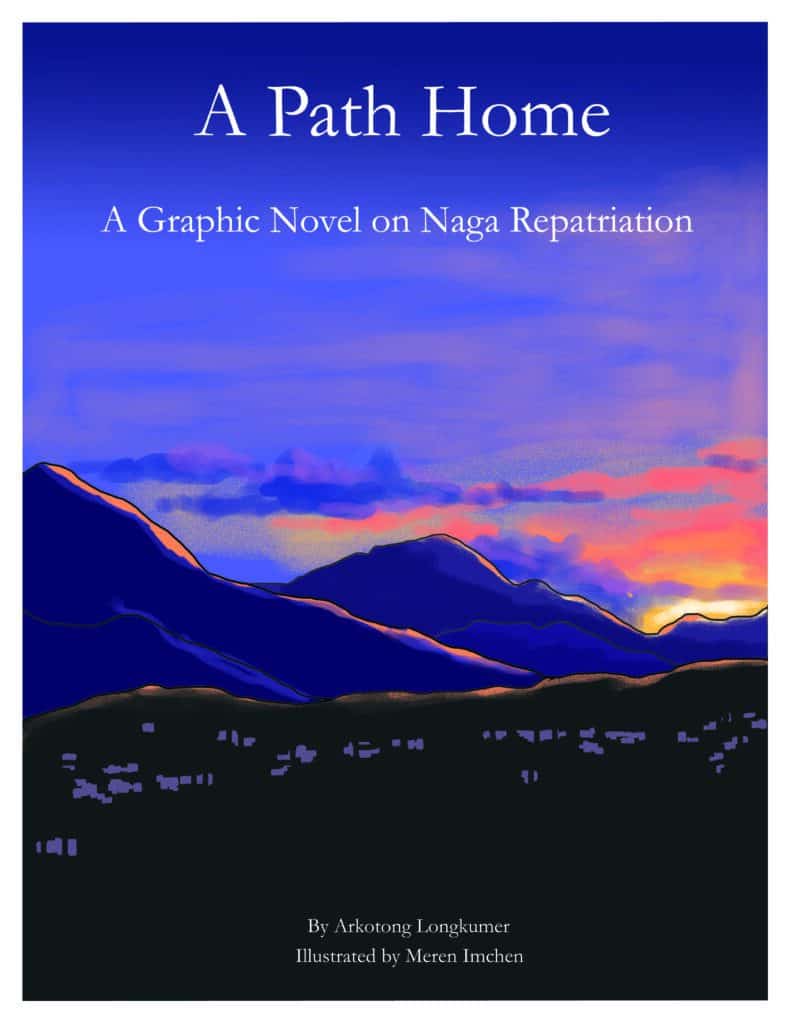Image: Communities interacting with the Gaidinliu collection, Nagaland, India. Photo credit: Tarun Bhartiya
Dr Arkotong Longkumer is Senior Lecturer in Modern Asia based in the School of Divinity and is an Edinburgh Futures Institute affiliate. His research broadly explores the digitisation of indigenous histories. He has previously received funding from the Futures Institute to digitise an important collection about the indigenous people of Nagaland in North East India.
Decolonising the Museum
Dr Longkumer’s current project, DiMuse (Decolonising the Museum: Digital Repatriation of the Gaidinliu Collection from the UK to India), explores the relationship between material artefacts, museums, and indigenous communities – with a particular focus on the Gaidinliu Collection at the Pitts Rivers Museum in Oxford. The collection features the personal belongings of Gaidinliu, a Naga who led an uprising against British colonialists, aged 16, between 1929 and 1932. When Gaidinliu was captured, items such as her notebooks, clothing, bracelets, and various ritual objects were confiscated and later donated to the museum.
DiMuse is a 4-year research project (2022–2026) funded by the Arts and Humanities Research Council, led by Dr Longkumer as Principal Investigator, Professor Clare Harris from the University of Oxford (Co-Investigator), Dr Gaurav Rajkhowa (Postdoctoral Research Fellow), University of Edinburgh, and other research and community partners in the UK and India. The grant involves a number of activities – a film documentary, a graphic novel, a bespoke online exhibition with 3D objects curated onto a website, and a final exhibition at the Pitt Rivers Museum.
DiMuse aims to show how the Gaidinliu collection needs to be rethought, reframed, and challenged, as it opens up larger questions about digital repatriation, ownership and knowledge production. According to Dr Longkumer, some of these questions are:
“How do objects evolve when interpretations and priorities about them alter, and when they affect people in different ways at different times? Furthermore, how can the project inform international debates about Indigenous traditional knowledge protection and the promotion of Indigenous intellectual property rights?”
Naga Archives and Research Centre digitisation
Dr Longkumer has previously led other projects on the digitisation of historical artefacts. In 2019, he was awarded funding by the Futures Institute to digitise the archive stored in The Naga Archives & Research Centre (NARC). NARC contains material documenting an important moment of Naga history (c.1947-present), as they emerged from the tumultuous period of British colonialism, World War II, and India’s independence in 1947.
The project involved the digitisation of thousands of local publications, documents, souvenir, and pictures of over 50 Naga leaders stored at NARC. According to Dr Longkumer, digitisation projects like this consider how we reframe, review and challenge current practices around sharing knowledge, as digital mediums can democratise these processes and practices.
As part of another project on Naga ancestral human remains, he is collaborating with the Pitt Rivers Museum, and a research-led community initiative, Recover Restore and Decolonise (RRaD). As part of this, he worked with illustrator, Meren Imchen, to create a graphic novel called “A Path Home”. The digital novel employs an intergenerational method of storytelling focused around the Nagas’ encounter with the British and experiences of colonialism. It explores how memory works through the silence of history, while attempting to understand contemporary responses to decolonisation and revisit complex issues around ancestral human remains. The graphic novel uses data and dialogue from real people adapted into a narrative form and is free to read online.

Digital repatriation and decolonisation
Dr Longkumer has found there is still much to understand when imagining new futures for indigenous people, and how digital repatriation can help in the process. He imagines the creation of a digital museum which will allow people to respond, engage with, and articulate their own voices around indigenous historical artefacts.
The DiMuse project is in its early stages and the researchers plan to set up discussions with the Naga communities to get their views on what knowledge-sharing could look like, and how they themselves might view the process of collecting and exhibiting knowledge. This would democratise much of the digital repatriation process and create a working methodology for future work applicable to indigenous groups around the world.
Dr Longkumer said:
“The Hawaiian and Aboriginal indigenous communities have also demonstrated powerful ways to deconstruct their place in society in relation to colonial structures, highlighting cases where fruitful dialogues between groups is possible. By bringing together these experiences, we can also think about conversations we could have with bodies like the United Nations on the Declaration of the Rights of Indigenous Peoples, and the conditions of social justice, human rights, and how we can talk to the different groups involved.
“Decolonization is also about how we take ownership of our history and how we then articulate that, so that it is not a top-down process, but it’s coming from the people themselves.”
Further information
Dr Arkotong Longkumer research profile
Read about the AHRC funding for DiMuse and Dr Arkotong Longkumer
DiMuse at Pitt Rivers Museum, Oxford
Prophecy and indigenous knowledge in a digital age
The Naga Archives and Research Centre (NARC)





